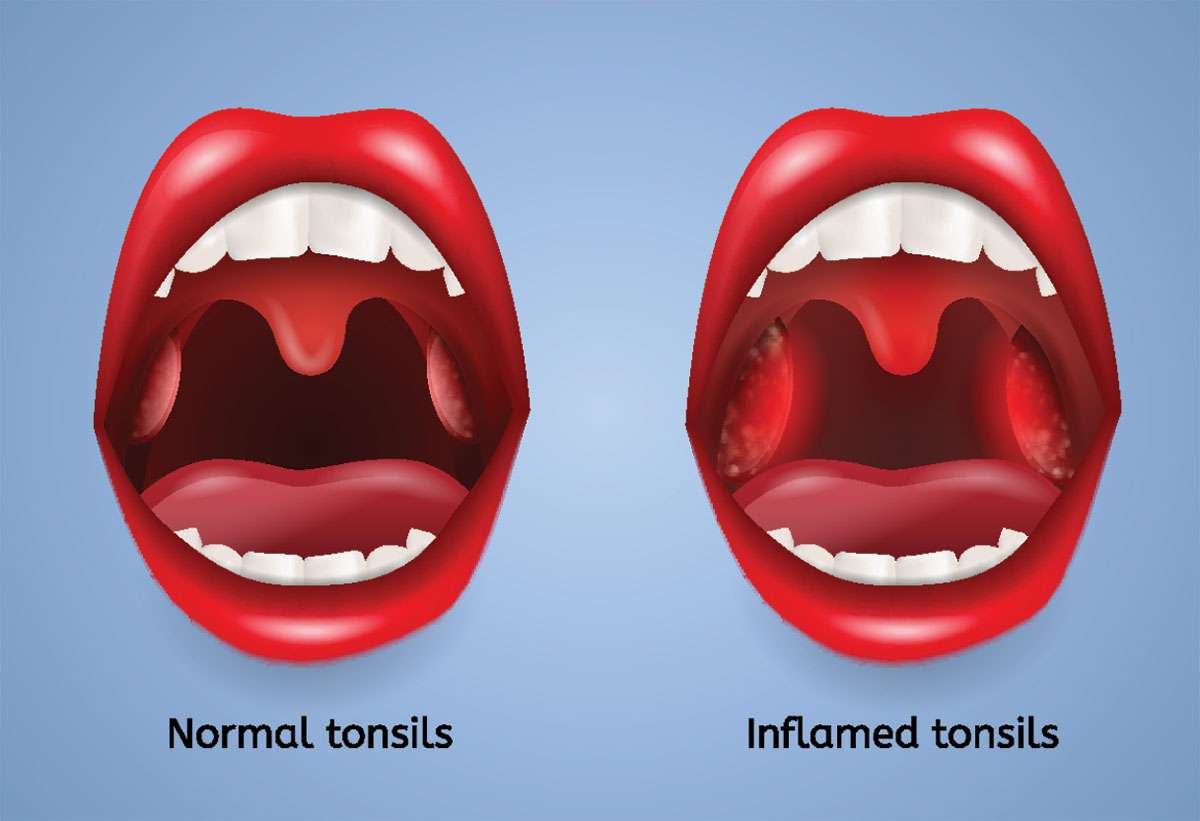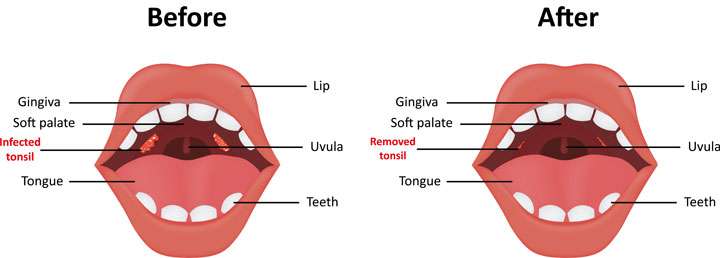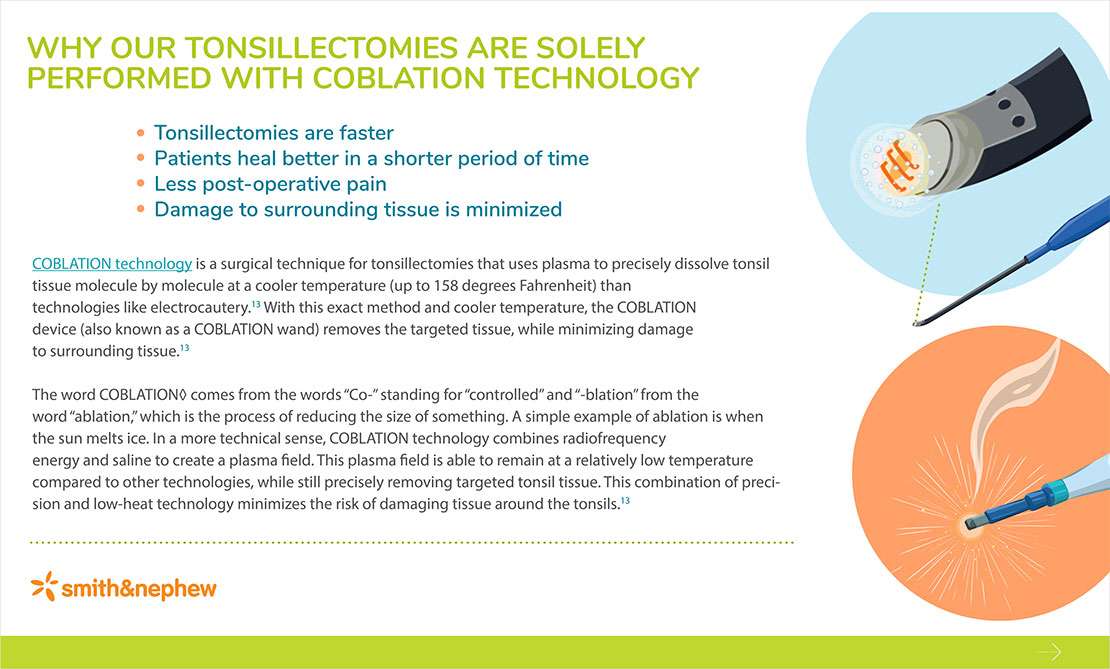Tonsillitis
Ever wonder why your child keeps getting recurrent tonsillitis? Do enlarged tonsils and adenoids cause snoring? Can tonsils and adenoids grow back?

What are tonsils and adenoids? Ever wonder why your child keeps getting recurrent tonsillitis? You may also ask if enlarged tonsils and adenoids are causing your child to snore? And surgery is needed, can tonsils and adenoids grow back? What are those little white stones inside the tonsils? These are just a few of the questions parents frequently ask the tonsil doctors at BergerHenry ENT Specialty Group. If any of these questions have crossed your mind regarding your child or even you, we have some interesting answers!
What Are Tonsils and Adenoids?
Tonsils are a pair of soft tissue masses located in the back of the throat. Adenoids are located in the back of the nose. Running throughout the tonsils are small pits, called crypts. Tonsils and adenoids are made up of lymph tissue, which is a type of tissue located throughout our body to fight off infection. Removing the tonsils and adenoids does not make one more susceptible to infection as there are hundreds of lymph nodes located in the head and neck alone to continue fighting off infection. Over half a million tonsillectomies are performed each year in the US, second to recurrent tonsillitis or sleep disordered breathing.
Why Does My Child Keep Getting Recurrent Tonsillitis?
Tonsillitis can be caused by a bacterial or viral infection. Group A streptococcus is the most common type of bacteria that can cause tonsillitis. Epstein Barr Virus, or EBV, is the virus that causes mononucleosis, which is often a viral cause of tonsillitis. The bacteria and viruses that cause tonsillitis are typically spread from person to person through coughing, sneezing, kissing, sharing food or drinks and playing with toys. These germs can easily spread between children in daycare, school or even between family members at home. During an acute infection, the tonsils oftentimes enlarge and can even stay enlarged after the infection has cleared. If your child is getting recurrent infections, he/she may benefit from an evaluation by our double certified tonsil doctors to determine if a tonsillectomy is warranted.

Tonsillitis Symptoms
- 5-7 tonsil infections in one year or at least 5 infections per year for 2 years or at least 3 infections per year for 3 years
- Recurrent peritonsillar abscess (a collection of pus beside the tonsil)
- Sleep disordered breathing
- Unilateral (one sided) tonsillar hypertrophy
Are Enlarged Tonsils and Adenoids Causing My Child to Snore?
Tonsillar and adenoid hypertrophy are the most common causes of sleep disordered breathing in children. As your child sleeps, the muscles in the back of the nose and throat relax which can result in obstruction of the airway from enlarged tonsils and adenoids, thus resulting in snoring, gasping for breath or apnea during sleep. Sleep studies are not routinely needed in diagnosing sleep disordered breathing in children and the decision to perform a adenotonsillectomy can usually be made by physical exam findings and the history given by the parents to our tonsil doctors at BergerHenry ENT.
Children who are not getting a restful night of sleep may present with hyperactivity, irritability or behavioral issues at school. Studies have shown a link between Attention Deficit Hyperactivity Disorder (ADHD) and snoring and sleep apnea in children. If you are concerned that your child may have sleep disordered breathing or are hearing your child snore or stop breathing at night, it will be beneficial to see our ENT doctors to further evaluate if enlarged tonsils and adenoids are playing a role in your child’s symptoms.
Can Tonsils and Adenoids Grow Back After a Tonsillectomy?
The simple answer is no. Once tonsils are removed, they will not grow back. However, if only a partial tonsillectomy or intracapsular tonsillectomy is performed, there are oftentimes some residual tonsil tissue left behind, which can become enlarged over time. Adenoid tissue will typically reach its maximum size by age 5 and begin to regress around age 7. Adenoids run the risk of regrowing depending on the age of the child having an adenoidectomy. If a child has an adenoidectomy at a very young age, there is a risk of the tissue regrowing if the child is exposed to recurrent infections or allergies.
What Are Those Little White Stones Inside the Tonsils?
Tonsilloliths or tonsil stones are calcified materials that get stuck in the crypts of tonsils. Tonsil stones typically result from material, such as food or saliva, getting retained within the tonsillar crypts. The material mixes with bacteria present in the tonsils resulting in the formation of tonsil stones. Symptoms include halitosis (bad breath), sore throat, enlarged tonsils and visualization of tonsilloliths within the tonsils. Treatment of tonsil stones include gargling after meals, trying an oral irrigator to expel the tonsilloliths out of the tonsil or, in some cases, tonsillectomy.
Adult Tonsillitis: Coblation Technology and What To Expect After Your Tonsillectomy

It is true that it can be tough to get your tonsils out as an adult. Most adults have had many more years of infection than children, and their tonsils are bigger, leaving behind a bigger empty space that the body has to heal. But the good news is that the satisfaction rate after adult tonsillectomy is very high. By the time you have been through enough to want them removed, and have met surgical criteria, you will be very happy when they are gone! For both children and adults, we prefer Coblation Technology, an alternative to traditional tonsillectomy techniques, to remove tonsils. Coblation Technology uses plasma to dissolve tonsil tissue at a cooler temperature than technologies like electrocautery (which is the traditional method). Because the Coblation Wand instrument is so precise (it dissolves tonsil tissue, molecule by molecule) and we use cooler temperatures, our tonsillectomy procedures are faster and patients heal better in a shorter period of time. Even better – there is less post-operative pain and damage to surrounding tissue is minimized.

BergerHenry ENT Tonsil Doctors Are Double Certified
If you feel as though your child or even you is suffering from any of the aforementioned issues, the double-certified tonsil doctors at BergerHenry ENT Specialty Group are here to carefully treat tonsillitis for anyone in your family. We may give you some tips for at-home care, perhaps prescribe antibiotics, or even recommend a tonsillectomy or adenoidectomy. We have six locations to serve you in the metro Philadelphia area.
